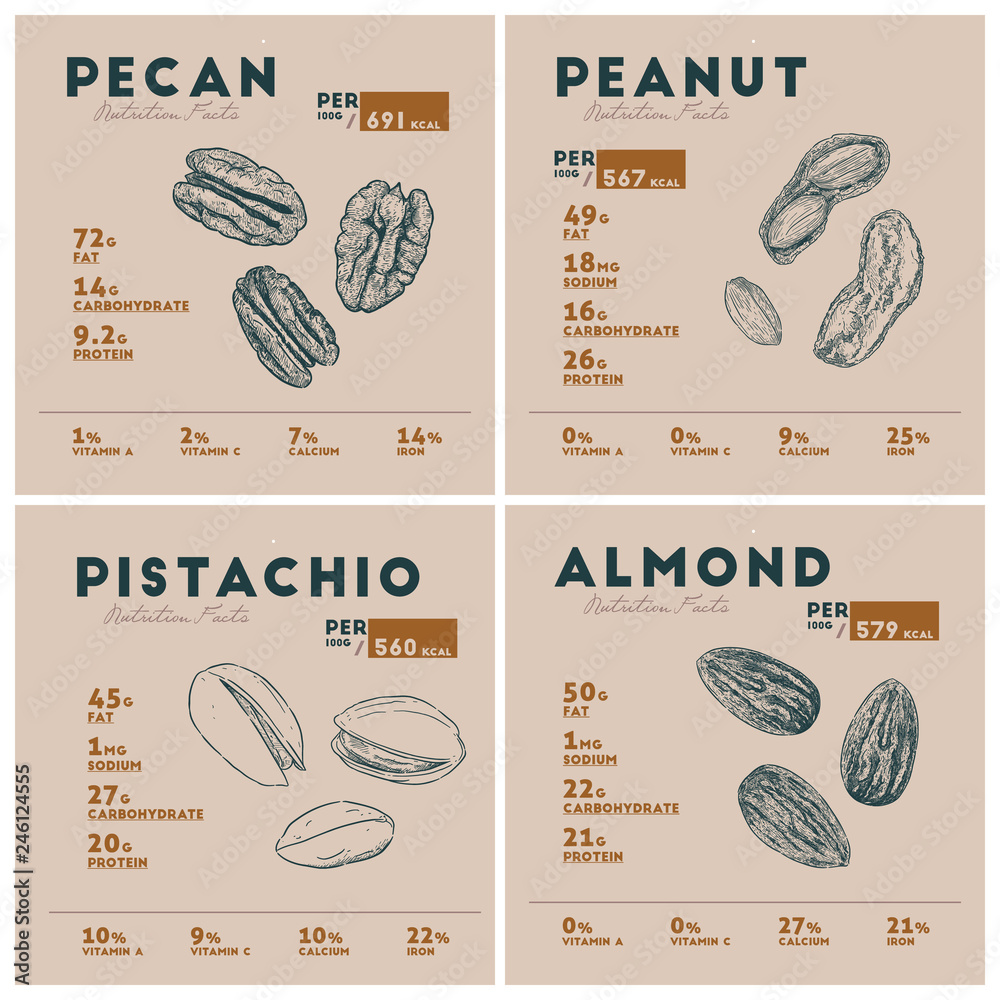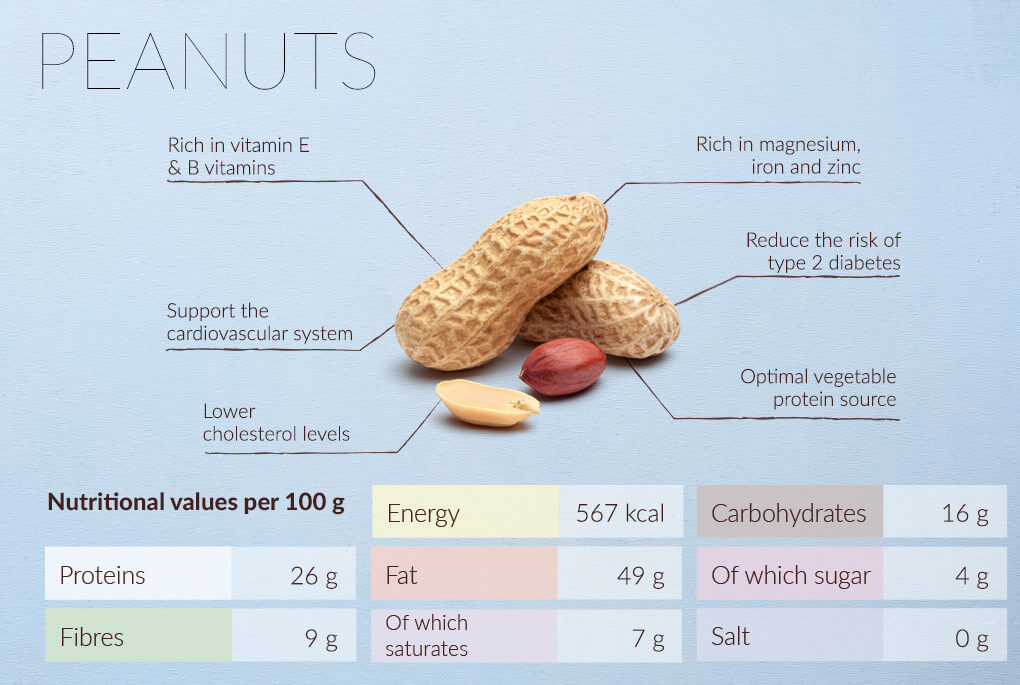Nuts Nutrition Facts 100G, with 100g containing essential nutrients like protein, healthy fats, and fibre. Incorporating nuts into your diet can support overall health and well-being.
Nuts are a nutrient-dense food that offers a mix of protein, healthy fats, vitamins, and minerals. They are versatile ingredients that can be enjoyed independently or added to various dishes for an extra nutritional boost. Whether you prefer almonds, walnuts, cashews, or pistachios, including nuts in your diet can improve heart health, weight management, and overall wellness.
Discover the benefits of nuts and how to incorporate them into your daily meals for a delicious and nutritious addition to your diet.
The Nutritional Benefits Of Nuts
Discover the nutritional benefits of nuts with 100g nutrition facts. Packed with healthy fats, protein, and antioxidants, nuts are a delicious way to support your overall well-being. Incorporate them into your diet for a nutritious boost.
Rich Source Of Essential Nutrients
Nuts are a powerhouse of essential nutrients, providing a rich source of vitamins, minerals, and antioxidants. A 100g of nuts contains significant protein, fibre, healthy fats, vitamin E, magnesium, and zinc. These nutrients play crucial roles in supporting overall health, promoting proper immune function, and aiding in the prevention of chronic diseases.
High In Healthy Fats
Nuts are renowned for their high content of healthy monounsaturated and polyunsaturated fats, including omega-3 and omega-6 fatty acids. These heart-healthy fats help lower bad cholesterol levels, reduce the risk of cardiovascular diseases, and promote brain health. Incorporating a serving of nuts into your daily diet can help maintain optimal lipid profiles and support cardiovascular well-being.
Essential Nutrients Found In Nuts
Nuts are packed with essential nutrients, making them a valuable addition to a balanced diet. Below, we’ll explore the key nutrients found in nuts and highlight their rwe’llablwe’llritional benefits.
Protein
Nuts are a rich source of plant-based protein, making them an excellent option for individuals following vegetarian or vegan diets. With approximately XXg of protein per 100g, nuts help support muscle growth and repair and overall body function.
Fibre
Nuts are also high in dietary fiber, which aids in digestive health and promotes a feeling of fullness. This helps to control appetite and maintain a healthy weight. Incorporating nuts into your diet can contribute to meeting your daily fibre requirements and supporting digestive regularity.
Vitamins And Minerals
Nuts contain essential vitamins and minerals, including vitamin E, magnesium, phosphorus, and potassium. Vitamin E acts as an antioxidant, protecting cells from damage, while magnesium, phosphorus, and potassium play vital roles in maintaining overall health, including bone strength and heart function.
Health Benefits Of Including Nuts In Your Diet
Nuts, a powerhouse of nutrients, contain protein, healthy fats, and antioxidants in 100g servings. Including nuts in your diet can boost heart health and offer a range of essential vitamins and minerals for overall well-being. These nutritional powerhouses are a convenient and tasty addition to any meal plan.
Heart Health
Including nuts in your diet can have significant benefits for your heart health. Nuts are rich in heart-healthy monounsaturated and polyunsaturated fats, which have been shown to help lower LDL (bad) cholesterol levels and reduce the risk of heart disease. They also contain fibre, which can help lower cholesterol levels further. In addition, nuts are packed with essential nutrients such as vitamin E, magnesium, and potassium, contributing to overall heart health. Regular consumption of nuts has been linked to a decreased risk of heart attacks and strokes.
Weight Management
Contrary to popular belief, nuts can be a beneficial addition to your weight management efforts. While nuts are energy-dense, meaning they contain a relatively high number of calories per gram, studies have shown that they do not contribute to weight gain when consumed in moderation as part of a balanced diet. The healthy fats and protein in nuts can help promote satiety and reduce cravings for unhealthy snacks. Including nuts as a part of your meal or as a snack can help you feel fuller for longer, assisting in weight management.
Improved Brain Function
Adding nuts to your diet can also support improved brain function. Nuts are a rich source of nutrients essential for brain health, including omega-3 fatty acids, antioxidants, and vitamin E. Omega-3 fatty acids, found explicitly in walnuts, have been associated with improved cognitive function and a reduced risk of age-related mental decline. Antioxidants found in nuts help protect brain cells from oxidative stress and inflammation, which are known to contribute to age-related cognitive decline. Additionally, vitamin E in nuts plays a role in maintaining healthy brain function and may help reduce the risk of Alzheimer’s disease. To reap the maximum health benefits, enjoy a variety of them as part of a balanced diet. Incorporate tAlzheimer’sur mealAlzheimer’ssprinkling chopped nuts on salads or add them to stir-fries. You can also have them as a snack by grabbing a handful of mixed nuts or pairing them with fruits for a satisfying and nutritious treat. While nuts are nutritious, they are also calorie-dense, so consuming them in moderation is essential as part of an overall healthy eating plan.
Comparison Of Different Nuts
Discover the impressive, nutritious benefits of various nuts per 100g. From heart-healthy almonds to protein-rich peanuts, each nut offers a unique blend of essential nutrients, including healthy fats, protein, and fibre. Incorporating a variety of nuts into your diet can contribute to overall health and well-being.
Almonds
Almonds are a highly nutritious nut packed with essential vitamins and minerals. They are a great source of healthy fats, fibre, and protein. Here are some critical nutritional facts about almonds:
- Calories: 576 kcal
- Protein: 21.22g
- Fat: 49.93g
- Carbohydrate: 21.67g
- Fibre: 12.5g
Almonds are rich in vitamin E, an antioxidant that helps protect cells from damage. They also contain magnesium, calcium, and potassium, which are essential for bone health. Additionally, almonds have been shown to have heart-healthy benefits, helping to lower cholesterol levels and improve cardiovascular health.
Walnuts
Walnuts are known for their distinct shape and rich flavour. They are not only delicious but also offer several health benefits. Here’s what you need to know about the nutritional conHere’sf walnuts:
- Calories: 654 kcal
- Protein: 15.23g
- Fat: 65.21g
- Carbohydrate: 13.71g
- Fibre: 6.7g
Walnuts are an excellent source of omega-3 fatty acids, which are essential for brain health and reducing inflammation. They are also highly antioxidants and contain imperative minerals like copper, manganese, and magnesium. Incorporating walnuts into your diet can promote heart health and improve cognitive function.
Cashews
Cashews are not only tasty but also offer a wide range of nutrients. They are a good source of healthy fats, protein, and vitamins. Let’s look at the nutritional profile of cashewLet’slories: 553 kcal.
- Protein: 18.22g
- Fat: 43.85g
- Carbohydrate: 30.19g
- Fibre: 3.3g
Cashews contain heart-healthy monounsaturated Let’sthat can help lLet’sharmful cholesterol levels. They also provide essential minerals like zinc and iron, necessary for immune function and energy production. Including cashews in your diet can improve well-being and support a healthy immune system.
Pecans
Pecans are known for their rich, buttery flavour and are commonly used in baking and cooking. They are not only delicious but also offer a range of essential nutrients. Here’s an overview of the nutritional content of pecanHere’sories: 691 kcal
- Protein: 9.17g
- Fat: 71.97g
- Carbohydrate: 13.86g
- Fibre: 9.6g
Pecans are a good source of antioxidants to help neutralize Here’ radicals. They are rich in heart-healthy monounsaturated fats and contain minerals like manganese and copper. Including pecans in your diet can support brain health, promote healthy digestion, and provide a delicious addition to various dishes and desserts.
Impact Of Nuts On Various Health Conditions
The Impact of Nuts on Various Health Conditions is substantial, as they are known to have positive effects on several health issues. Let’s look closer at how nuts can impact diabetLet’sholesterol levels and inflammation.
Diabetes
Nuts can significantly help manage diabetes by controlling blood sugar levels. They are an excellent source of healthy fats, Let’sein, and fibre, which can help regulate blood glucose levels and reduce the risk of developing type 2 diabetes.
Cholesterol Levels
Eating nuts as part of a healthy diet can help lower LDL cholesterol levels, also known as “bad” cholesterol. The unsaturated fats in nuts, including fatty acids, can help lower cholesterol levels, reducing the risk of heart disease.
Inflammation
Nuts contain antioxidants and anti-inflammatory property” s t” at can help reduce infl “MMA” ions. Incorporating nuts into your diet may help decrease the risk of chronic diseases associated with inflammation, such as heart disease and certain types of cancer.

Credit: shop.mylittlemoppet.com
Incorporating Nuts Into Your Daily Meals
When hunger strikes between meals, nuts can be the perfect energizing snack to keep you going. Here are some creative ways to incorporate them into your daily snacking routine:
- Trail mix: Combine various nuts with dried fruits and seeds for a flavorful snack on the go.
- Nut butter: Spread almond or peanut butter on whole-grain crackers or apple slices for a satisfying treat.
- Yogurt topping: Sprinkle chopped nuts over yogurt for added crunch and nutrition.
Boost the nutritional value of your meals by including nuts in your recipes. Here are some ways to incorporate them into your daily dishes:
- Salad topping: Add chopped nuts to your salads for a crunchy texture and extra protein.
- Stir-fries: Include nuts like cashews or peanuts in your stir-fry dishes for a flavorful twist.
- Grain bowls: Sprinkle nuts over grain bowls for a nutritious and filling meal option.
Potential Side Effects And Allergies
Nuts are generally considered a healthy addition to your diet, but it’s essential to be aware of their potential side effects and allergies. Before incorporating nuts into your diet, it’s necessary to understand the possible risks and allergens they may pose.
Nut Allergies
Nut allergies are the most common food allergies, ranging from mild discomfort to severe, life-threatening reactions. To prevent allergic reactions, those with nut allergies should carefully read food labels and avoid foods that may contain nuts or nut traces.
Overconsumption Risks
While nuts offer numerous health benefits, overconsuming them can lead to certain risks. Nuts are calorie-dense, and excessive consumption may contribute to weight gain. Additionally, consuming large quantities of nuts quickly may cause digestive issues such as bloating, gas, and stomach discomfort.

Credit: stock.adobe.com

Credit: www.verival.at
Frequently Asked Questions Nuts Nutrition Facts 100G
What Is The Healthiest Nut To Eat?
Almonds are the healthiest nut to eat. They are high in protein, fibre, and healthy fats and have been linked to numerous health benefits. They are also rich in vitamin E and magnesium.
Is 100g Of Nuts A Day Too Much?
Eating 100g of nuts daily is not too much and can be a healthy part of your diet. Nuts provide essential nutrients and can support heart health. It’s important to incorporate variety and consider your overall calorie intake from all sources.
Is 50g Of Nuts A Day Too Much?
Eating 50g of nuts daily is not too much and can benefit health.
Which Nut Is Highest In Protein?
Peanuts have the highest protein cIt’snt among nuts.
ConclusiIt’sNuts are packed with powerful nutrients, promoting heart health and overall well-being. With their high protein content and essential vitamins, incorporating nuts into your diet is an intelligent choice. From almonds to walnuts, each variety offers its unique benefits.
Make nuts a daily part of your healthy routine.






